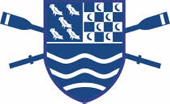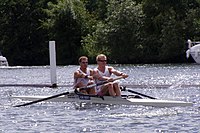
Leander Club, founded in 1818, is one of the oldest rowing clubs in the world, and the oldest non-academic club. It is based in Remenham in Berkshire, England and adjoins Henley-on-Thames. Only three other surviving clubs were founded prior to Leander: Brasenose College Boat Club and Jesus College Boat Club and Westminster School Boat Club, founded in 1813.

The Championship Course is a stretch of the River Thames between Mortlake and Putney in London, England. It is a well-established course for rowing races, particularly the Oxford and Cambridge Boat Race. The course is on the tidal reaches of the river often referred to as the Tideway. Due to the iconic shape of the Championship Course, in orthopaedic surgery, an "S" shaped incision along the crease of the elbow is commonly referred to as "a boat-race incision resembling the River Thames from Putney to Mortlake."

Vesta Rowing Club is a rowing club based on the Tideway of the River Thames in Putney, London, England. It was founded in 1870.

Stephen Fairbairn was a rower and an influential rowing coach at Jesus College Boat Club, Cambridge University, Thames Rowing Club and London Rowing Club in the early decades of the 20th century, and founded the prestigious Head of the River Race in 1925.

The Thames Rowing Club (TRC) is a rowing club based on the tidal Thames as it flows through the western suburbs of London. The TRC clubhouse stands on Putney Embankment. The club was founded in 1860.

London Rowing Club is the second oldest of the non-academic active rowing clubs on the Thames in London, United Kingdom. It was founded in 1856 by members of the long-disbanded Argonauts Club wishing to compete at Henley Royal Regatta.
The Fuller's Head of the River Fours (HOR4s) is a processional rowing race held annually on the Tideway of the River Thames in London on the 4+1⁄4-mile (6.8 km) Championship Course from Mortlake to Putney.

The Women's Eights Head of the River Race (WEHoRR) is a processional rowing race held annually on the Tideway of the River Thames in London on the 4+1⁄4-mile (6.8 km) Championship Course from Mortlake to Putney.

The Wingfield Sculls is a rowing race held annually on the River Thames in London, England, on the 4+1⁄4 miles (6.8 km) Championship Course from Putney to Mortlake.

Curlew Rowing Club is a rowing club based on the Tideway of the River Thames at Greenwich, London, England. It was founded in 1866 and has been in Greenwich without interruption for over 130 years, though not always called Curlew.
The Thames is one of the main rowing rivers in Europe. Several annual competitions are held along its course, including the Henley Royal Regatta, the The Boat Race and other long-distance events, called Head of the River races (Heads).

Tideway Scullers School is a rowing club on the Tideway of the River Thames next to Chiswick Bridge in Chiswick, London.

Putney Town Rowing Club (PTRC) is a rowing club on the Tideway, the tidal reach of the River Thames in England. Its official British Rowing registered colours are navy and white.

University College London Boat Club (UCLBC) is a rowing club on the River Thames, based at Hartington Road, Chiswick.

Beth Rodford is a British rower. Rodford participated in two Olympic games, 2008 Summer in Beijing and 2012 Summer in London. At Beijing, she finished in fifth place in the Women's Eight. In 2012 at London, she finished in sixth position in the quadruple sculls. She announced her retirement from international rowing on 16 December 2015.

Jessica Jane Eddie is a British rower. She won a silver medal in the women's eight at the 2016 Olympic Games in Rio de Janeiro.

Cantabrigian Rowing Club, known as Cantabs, is a 'town' rowing and sculling club in Cambridge, UK.

Reading University Boat Club is the rowing club for the University of Reading in the United Kingdom. It is based at a boat house in Christchurch Meadows on the River Thames in the Reading suburb of Caversham. The club has a focus on sculling. It has consistently been one of the more successful university rowing clubs in Britain, including topping the medal table at the BUCS regatta in 2011 and at the BUCS small boats head in 2014 and 2015, as well as wins at Henley Royal Regatta in 1986, 2008, 2009, 2010, 2011 and 2013, and is considered one of the top six university rowing clubs in the UK. A number of former members have competed at the Olympics, including double gold-medallists James Cracknell and Helen Glover. The club has organised the Reading University Head of the River race since 1935.

Abingdon Rowing Club is a rowing club on the River Thames based on Wilsham Road in Abingdon-on-Thames, Oxfordshire.


















